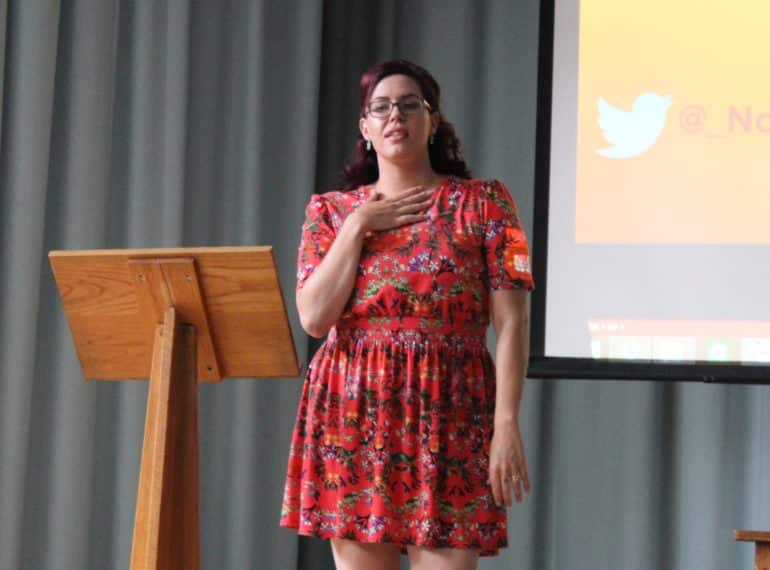What’s on your mind? Lecture tackles boys’ questions on mental health issues

An award-winning mental health campaigner gave senior boys some serious food for thought when she visited the School.
Natasha Devon looked at topics ranging from the need to deal with stress and the perils of stoicism, to the limitations of the English language, during a lecture assembly given to Years 10 and 12.
She made sure her answers were truly relevant by inviting boys to submit their questions anonymously in advance – and received questions on body image, the pressures on men to not cause offence, social media, examination stress, gender and even the TV programme, Love Island.
Headmaster Neil Enright said: “We want all our pupils to be both happy and resilient; we therefore arrange events such as this lecture in order to nurture boys’ wellbeing. I am grateful to Natasha for her engaging examination of some of the key issues relating to mental health.”
Natasha, who won an MBE for services to young people in 2015 and a Fellowship from the University of Wales in the following year, used the boys’ pre-submitted questions to structure her talk.
She emphasised that stoicism should not be equated with strength, telling the boys that they could, in fact, demonstrate strength by talking about problems, confiding in others and seeking help. Yet she acknowledged that this could be tougher for boys than for girls because gendered language equates masculinity with strength. She suggested gender is a spectrum and that generalisations such as ‘men are like this’ and ‘women are like that’ only deal with an average and, even then, one that most people would not fully identify with.
She recounted her experience of trying to deal with difficult family matters when she was about ten years old – and the eldest child among her siblings and cousins – by being ‘strong’, reasoning that because things were not happening to her directly they were not really affecting her. But this, she felt, probably contributed to the anxiety, panic attacks and eating disorder she suffered from subsequently.
Natasha, who has authored and contributed to books on mental health, urged that, just as physical health is considered relevant to everyone – not just those who are ill – so everyone should be aware of mental health: it should not be considered to be an issue only for those who experience a mental health problem.
While encouraging the boys to discuss things with each other, she pointed out that they could not expect to be able to fix other people’s mental health issues, just as people who are not doctors would not expect to be able to cure a physical ailment. There were measures that laypeople could take to help, however: she is promoting having trained mental-health first-aiders in all workplaces. (QE’s pastoral staff have already been trained.) Importantly, she said, such training helps people know what to say and what not to say: although English had the greatest variety in its vocabulary overall, it was far more limited than many other languages in expressing feelings and emotions – something, she opined, which doesn’t help!
 Natasha also listed factors which contribute to good mental health, stating that it helps to:
Natasha also listed factors which contribute to good mental health, stating that it helps to:
• Be loved
• Have a sense of belonging
• Have a purpose
• Achieve things
• Feel that your voice is heard.
She advised the boys that they needed to deal with stress so that it does not “overflow”. Mindfulness techniques, endorphin-releasing physical activity and taking breaks from revision could all help and might even prevent one’s mind going blank in an examination.
